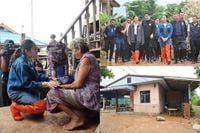On June 28, 2025, Prime Minister Paetongtarn Shinawatra, accompanied by her cabinet and senior officials from the Ministry of Interior, made a hands-on visit to Chiang Rai province to assess the aftermath of severe flooding that struck the region the previous day. The delegation focused their attention on Mae Pao sub-district and Ban Sop Pao in Phaya Mengrai district, areas heavily impacted by the flash floods caused by relentless rainfall from June 26 to 27.
The flooding wreaked havoc across five districts, ten sub-districts, and 32 villages within Chiang Rai, affecting a total of 4,405 households. Infrastructure suffered significant damage, with three roads and two public health facilities impaired, while approximately 500 rai of rice fields were devastated, threatening the livelihoods of many local farmers.
Governor Charin Thongsuk of Chiang Rai provided a detailed briefing to the Prime Minister and her team, outlining the scale of destruction and the ongoing response efforts. The province has mobilized a coordinated approach involving government agencies, private sector partners, and local administrative organizations to ensure swift and effective assistance. This includes evacuating residents from flood-prone areas to temporary shelters, distributing survival kits, and providing essential supplies to those displaced by the disaster.
Prime Minister Paetongtarn expressed deep concern for the affected communities, emphasizing the government's commitment to not only immediate relief but also longer-term rehabilitation. "I am deeply concerned for all the citizens impacted by the flooding," she said during her visit. "The government is not idle. I have ordered all relevant agencies to provide full assistance, including evacuation, healthcare, disease treatment, and essential goods to alleviate the initial hardships." She urged the public to maintain their health and stay informed through official channels, reassuring that assistance centers and hotlines are operational 24 hours a day.
Her visit also carried a strong message of solidarity and encouragement. Distributing survival bags personally to flood victims, she remarked, "This is a time when we must support each other. I have received much encouragement from the people I met, and I want to send my strength to all affected citizens." The Prime Minister’s presence underscored the government’s hands-on approach in crisis management and its dedication to restoring normalcy swiftly.
Deputy Minister of Interior Thirat Samrejwannich, Secretary-General to the Prime Minister Phrommin Lertsuridej, Permanent Secretary of the Ministry of Interior Arissat Sampantharat, Director-General of the Department of Provincial Administration Chaiwat Chuenchom, and Director-General of the Department of Disaster Prevention and Mitigation Phasakon Bunyarak accompanied the Prime Minister, reflecting the high-level coordination between national and provincial authorities. Their joint presence at Ban Sop Pao and Wat Santikhiri signified the seriousness with which the government is tackling the disaster.
Governor Thongsuk highlighted the extensive damage beyond residential areas, noting that public infrastructure such as roads and health services had been compromised, complicating relief efforts. The agricultural sector, particularly rice farming, faced substantial losses, with around 500 rai submerged or damaged. Authorities are currently conducting thorough assessments to determine the full extent of agricultural damage and plan appropriate support measures for farmers.
Chiang Rai’s integrated response strategy involves multiple layers of government and community participation. Local administrative organizations, district officials, village heads, and volunteer security teams have all been mobilized to assist in evacuation, distribute aid, and maintain safety. The provincial government’s swift action in moving residents to temporary shelters has been crucial in reducing potential casualties and safeguarding vulnerable populations.
The Prime Minister acknowledged that this year’s flooding was unprecedented in some areas, such as Ban Sop Pao, where residents reported never experiencing such severe inundation before. She attributed this partly to changing weather patterns, noting, "The heavy rains this year are a natural consequence of climate changes, but regardless, the government will not neglect the people and will ensure everyone receives the help they need to return to normal life as quickly as possible." This statement reflects growing concerns about climate variability and its increasing impact on vulnerable communities.
In addition to emergency relief, the government is focusing on both short-term and long-term rehabilitation. Efforts to repair damaged infrastructure, restore public health services, and support agricultural recovery are underway. The Ministry of Interior, in collaboration with Chiang Rai province, continues to monitor the situation closely, ensuring that assistance reaches all affected households and that recovery plans are adapted as necessary.
Throughout the visit, the atmosphere was one of resilience and mutual support. The Prime Minister’s hands-on approach and visible empathy resonated with locals, many of whom expressed gratitude for the government’s swift response and personal attention. This visit also served to boost morale among officials and volunteers working tirelessly on the ground.
As the floodwaters recede, the focus now shifts to rebuilding and restoring the livelihoods disrupted by this natural disaster. The government’s comprehensive response, blending immediate aid with strategic planning for recovery, aims to help Chiang Rai’s communities overcome this challenge and emerge stronger.
Prime Minister Paetongtarn’s visit to Chiang Rai on June 28 was a clear demonstration of leadership in times of crisis, highlighting the importance of coordinated government action and community solidarity in managing natural disasters. With continued attention and resources, the province is poised to recover, ensuring that its citizens can soon return to their daily lives with renewed hope and security.





